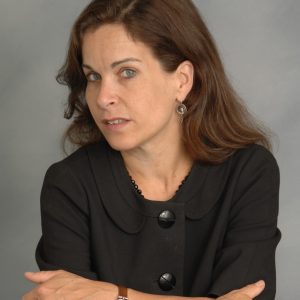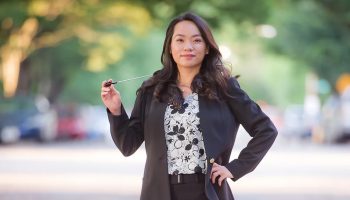
A pillow from high school, a fax machine and a glue stick — all ordinary things suggestive of a world beyond their material borders — are the stuff that populate Nicole Cooley’s “Marriage, Objects,” a poem about the artifacts of a shared life.
Cooley “doesn’t believe in inspiration,” but allows that such encounters with everyday objects can compel her toward poetry.
“When I think of what makes me want to write poems, I go back to my grandmother’s shoe buckles, a subway map, an old recipe, a photograph from a flea market of someone I have never met,” Cooley said. “So the world completely inspires me in many ways.”
The author of six poetry collections, including Girl after Girl after Girl and Of Marriage, as well as the novel, Judy Garland, Ginger Love, Cooley is the Week Seven poet-in-residence at the Chautauqua Writers’ Center, where she is teaching the workshop “Writing About the Difficult and Finding Grace in Poetry.” She directs the MFA Program in Creative Writing and Literary Translation at Queens College, CUNY, and was most recently a writer-in-residence at Chautauqua in 2016.
At 12:15 p.m. Tuesday, August 6 on the porch of the Literary Arts Center at Alumni Hall, Cooley will talk about “writing our obsessions,” “taking risks,” and “where our ideas for our writing come from” in her Brown Bag lecture, “Why I Don’t Believe in Inspiration.”
Committed to preserving a sense of fun and play in the practice of writing, Cooley lists 20th-century poets Gertrude Stein, Muriel Rukeyser and Langston Hughes as poets who, in the spirit of Lucille Clifton, “comfort the afflicted and afflict the comfortable.” More contemporarily, she turns to poets Naomi Shihab Nye, C.D. Wright and Joy Harjo, the U.S. Poet Laureate and Week Nine Chautauqua Literary and Scientific Circle author.
“I, most of all, love poems that stop me in my tracks — that make me take notice of the world in a new way,” she said. “I think if we could all get back to a childhood sense of play, the world would be a better place. That being said, I deeply believe in the power of language to change the self and the world.”
In 2017, Inside Higher Ed published a conversation between Cooley and Gale Renee Walden, a poet and friend of Cooley’s for more than 20 years. The two poets describe objects as “triggers” and “portals,” and Cooley shares how travels to “weird museums” — a lock museum, a museum of crime and punishment, a cocktail museum — allowed her to “refresh her language” as a poet. It’s a process she discusses in her essay for Poetry Society of America about “Marriage, the Franklin Mineral Museum,” a poem crowded with rocks that split, spill and fluoresce.
Challenged by a tough but well-meaning poet friend to expand her poetic vocabulary, Cooley visited niche museums boasting strange collections — like the aforementioned lock museum — in an experiment intended to help her reimagine the words that have a place in her poems. “Marriage, the Franklin Mineral Museum” was born by a quarry as Cooley transcribed the names of rocks, an exercise that bloomed into a piece about 9/11, marriage and motherhood.
She concludes the essay on that poem with a renewed sense of vigor.
“Writing this poem reminds me of what I love most about writing poetry, the way it can take us on a journey we never imagined or expected,” she writes.
Sometimes, rocks inspire.




